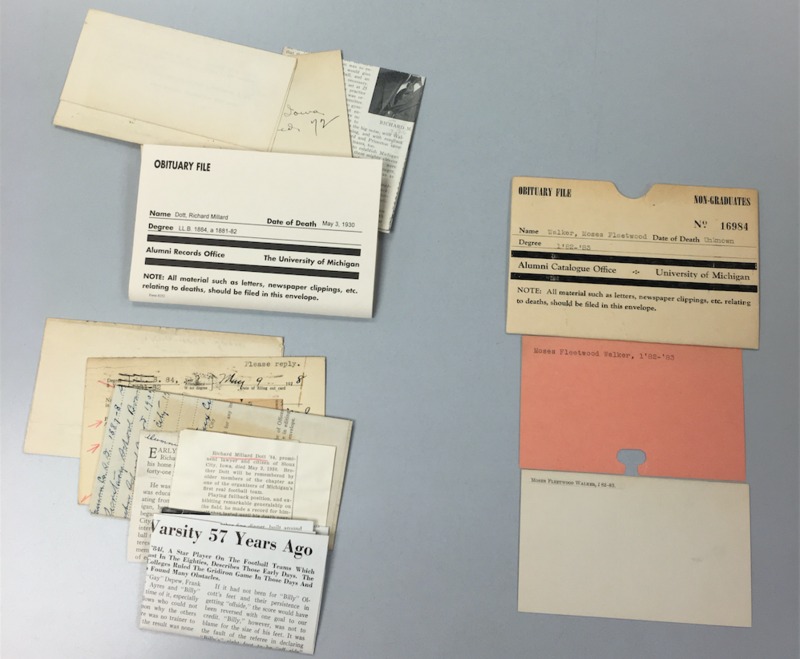Fleet Walker at Michigan and in the Pros
By the fall of 1881, Fleet Walker was enrolled in law school at the University of Michigan, where he displayed considerable flair and promise. Yet it was abundantly clear that Walker was in Ann Arbor primarily to play baseball. In fact, excitement over Walker’s presence at Michigan was somewhat palpable among the student body, as in H.A. Hodge’s 1881 article from The Chronicle, he noted that Walker “is second to no amateur catcher in the country. By many he is considered the equal of most of the League catchers. Building on this foundation we will have a nine that should beat almost any western team.” [1]
Throughout the spring of 1882, Fleet was referenced time and again in reports of baseball games in The Chronicle. On April 29, in a recap of Michigan’s game against Fort Wayne of Detroit, H.S. Mahon noted that “Walker, as catcher, did some of the finest work behind the bat that has ever been witnessed in Ann Arbor.” [2] On May 27, following a Michigan victory over Wisconsin, J.T. Winship wrote that “Walker’s catching cannot be too highly commended, and the general verdict is, that the man in the mask is a wonder.” [3] Quite clearly, Michigan baseball fans and Fleet’s teammates revered their black catcher. In recapping the 1882 baseball season—in which Michigan won every game played, outscoring their opponents 59-21—Richard Millard Dott noted that a “large part of our success was due to our catcher, Walker, who was one of the best catchers ever seen at the University. Had it not been for his color, he undoubtedly would have been found later in the National League.” [4]
While Walker never did make it to the National League, he decided not to return to Michigan for the 1883 baseball season, as he had been offered a paid position with the Toledo Blue Stockings in the American Association’s Northwestern League, which at the time was considered a Major League. It is for this reason that Fleet Walker is often hailed by baseball historians as the first African-American to play Major League Baseball. [5] In fact, up until the end of the 1889 season—when blacks were driven out of professional baseball entirely by “gentleman’s agreements” not to sign them—Fleet was one of baseball’s most promising young stars. In addition, Walker quickly became “a traveling poster for Negro aspirations, one held up almost daily in the faces of white Americans, as in this 1883 newspaper announcement [from the Columbus Ohio State Journal]:
Notes
Game to-day at 3:30
Only one game this week
Secure your season tickets at once
See Walker, the great colored catcher.” [6]
Today, Jackie Robinson is often hailed as the first African-American to break the color barrier in Major League Baseball. Yet the story of Fleet Walker—who for one season in the spring of 1882 was a Michigan Man—shows us that there are other similarly important narratives to remember.
[1] H.A. Hodge. The Chronicle (Ann Arbor, MI), December 17, 1881. Volume XIII, September 1881-June 1882. University of Michigan Bentley Historical Library, Ann Arbor, MI. p. 87.
[2] H.S. Mahon. The Chronicle (Ann Arbor, MI), April 29, 1882. Volume XIII, September 1881-June 1882. University of Michigan Bentley Historical Library, Ann Arbor, MI. p. 194.
[3] J.T. Winship. The Chronicle (Ann Arbor, MI), May 27, 1882. Volume XIII, September 1881-June 1882. University of Michigan Bentley Historical Library, Ann Arbor, MI. p. 226.
[4] Richard Millard Dott. Type-written report by Richard Millard Dott, May 20, 1882. Richard Millard Dott papers, 1880-1883. University of Michigan Bentley Historical Library, Ann Arbor, MI.
[5] Adler, Rich. Baseball at the University of Michigan. Charleston, SC: Arcadia Publishing, 2004. p. 15.
[6] Zang, David. Fleet Walker’s Divided Heart: The Life of Baseball’s First Black Major Leaguer. Lincoln, NE: University of Nebraska Press, 1995. p. 33.

